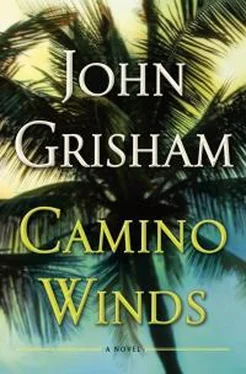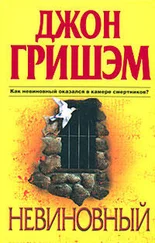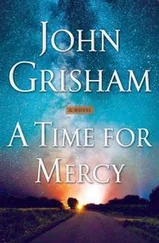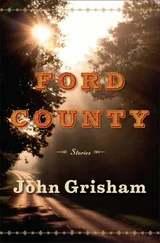His winds were 155 miles an hour, on the verge of rising to a Category 5, with projections of catastrophic damage and loss of life. He was also moving faster, almost fifteen miles an hour due west, with landfall now predicted at 10:30 p.m. at the heart of the island. By 4:00 p.m., the rains were torrential as the outer bands settled in with gusts strong enough to snap branches. Debris flew and scattered across the streets. At 5:30, a policeman knocked on Bruce’s door and asked what the hell he was doing at home. Bruce explained that he had already checked with the authorities and was staying put. He asked about his neighbors and was told that everyone had left.
When Nick returned around 6:00, the island suddenly got very dark. The sky turned black as thick clouds swirled violently not far above them.
Bruce hooked up his small generator and switched off all circuits except for the outlets in the den and kitchen. No other electricity was in use. They had plenty of flashlights and batteries. Dinner was steaks on the grill and frozen French fries with a bottle of pinot noir.
At 7:00 p.m., with the winds howling at eighty miles an hour, Bruce called the gang for the last time. Myra and Leigh were in a motel in Pensacola with their five dogs, who were causing trouble because they were nervous and barking. Amy was high and dry in Macon. Jay was staying with a friend in Miami. Andy Adam was at his mother’s in Charlotte. All were worried about their homes and about Bruce’s safety. They were glued to their televisions, and the predictions grew more ominous by the hour. Bruce assured everyone that he and Nick were safe and well prepared. He promised to check on their property as soon as possible and call when cell service was restored. Good night and God bless.
According to the state disaster chief, the most vulnerable section of the island was a half-mile stretch of beach known as Pauley’s Sound. It was on the far north end, near the Hilton, and, like most of the oceanfront, had been heavily developed with clusters of condos, old and new cottages, mom-and-pop motels, beachside bars and cafés, and tall modern hotels. The Sound was only a few feet above sea level and there were no dunes to protect it from a surge. Both Bob Cobb and Nelson Kerr lived there in a gated development known as Marsh Grove. Bruce called them last. Bob and his lady were hunkered down for the night. He seemed nonchalant and had obviously been drinking. Nelson Kerr was sitting in the dark and wishing he had fled too. Bruce invited him to hustle over to his house where things would certainly be safer, but Nelson said the police had closed all the streets. Trees and power lines were already down and the rain was falling in sheets.
By 8:00 p.m., the sustained winds were over a hundred miles an hour and howled with a roar so loud and constant that Bruce and Nick had trouble sitting still. With flashlights, they roamed the downstairs, looking cautiously through windows to gauge the damage, to see if limbs had fallen, to see if rainwater was flooding the street. They would sit for a moment in the den and try to enjoy a taste of bourbon, then a gust would blow through and rattle the house. Or they’d hear a crack in the distance.
The cracking sounds were the worst. With the first two, neither Bruce nor Nick was certain what was happening. Then they realized that wind was snapping off thick limbs, which sounded like nearby shotgun blasts. With each one they flinched and eased carefully toward a window.
For the past fifteen years Bruce had owned the Marchbanks House, an 1890 Victorian built the old way and designed to withstand hurricanes. At the moment he wasn’t worried about losing a roof or a porch, but there were two ancient oaks on the property with limbs large enough to do serious damage.
In the midst of the storm, as if the howling, rattling, and cracking were not enough, an odd cadence emerged. The roar was constant and slowly rising, and every minute or so a band of even stronger gusts swept through, as if to warn that heavier action was still out there over the water and not far behind. The gusts passed, the storm returned to its steady noise and strength, and Bruce and Nick took a sip of bourbon and hoped there would be no more gusts. Then a limb cracked and they peeked out the windows.
Just after 9:00, the power lines gave way and began to snap. The island was pitch black as the storm grew louder.
After two hours of getting battered by winds over a hundred miles per hour, the boys had had enough. Bruce thought about an attempt at humor with something like “Well, I guess we should’ve left,” but why bother? The eye was still two hours away and the winds had not reached their peak. The street was solid water from the rain and the surge had yet to arrive. Bruce was certain the ground floor of Bay Books was taking water.
But for the moment he and Nick were dry and safe. There was little they could do until morning. At 10:30 p.m., the projected time for the arrival of the eye, Bruce was certain that the house was about to shear off its foundation and crash into Dr. Bagwell’s across the street. Its floors and ceilings vibrated and the walls were literally shaking. The great fear was that a limb might crash through the den and open up the house to torrents of rain and more wind. They would be forced to flee and seek shelter, but where? There was no place to go.
It was almost 11:00 when the winds stopped and the night became perfectly still. Bruce and Nick stepped outside and waded to the street, where they looked at the sky and saw stars. A TV expert said that Leo’s eye would pass in about twenty minutes, and Bruce was tempted to take a look at downtown and check on his store. But again, why bother? He couldn’t stop the flooding. The cleanup would begin in the morning. He had plenty of insurance coverage.
They walked down the street, wading in ankle-deep water, and did not see another person, not another light. Evidently the policeman had been right—all of his neighbors had the good sense to leave. In the darkness it was impossible to see where all those limbs had landed, but there was debris everywhere.
The tranquility, along with the bourbon, settled their nerves, if only for a moment. As the minutes passed, a gentle wind arrived from the west and reminded them that the storm was only half over.
12.
Leo’s two-week reign of terror climaxed officially at 10:57 p.m. Eastern Standard Time when the center of his eye came ashore along the northern tip of Camino Island. True to form, he wiggled a bit at the end, moved to the north, and stalled just long enough to maintain a Category 4 ranking, with top winds at 145 miles per hour, almost reaching the rare status as a Cat 5 at 156 miles an hour. Not that it really mattered. Eleven miles per hour mean little in such a powerful storm, and long before and long after the eye came and went its winds battered the island. Old cottages built decades earlier were blown off their stilts. Newer ones hung on but lost windows, doors, roofs, decks. The top storm surge around the eye was fifteen feet in some areas, enough to flood hundreds of cottages, homes, motels, and stores. Main Street was under four feet of water, and some of the older homes in the historic section took in water for the first time in history.
Along the ocean, all boardwalks and piers were gone. Inland, limbs and entire trees blocked streets and driveways. Parking lots were covered with roof shingles, garbage, more jagged tree limbs. In the docks and harbors, boats of all sizes were strewn about like scattered firewood.
Though virtually everyone had fled, some of the few who stayed behind did not survive. At sunrise, the first siren could be heard wailing across the island.
13.
Bruce slept for two hours on a sofa in the den and awoke with cobwebs and a stiff back. The wind was gone, the house was quiet and dark, the storm was over. He walked to a window and saw the first hint of sunlight. He put on rubber boots and walked outside where he waded through six inches of water and looked at his house from across the street. A few squares of slate were missing from the roof and a third-floor gutter had been ripped off, but the house was in remarkable shape. All of the heavy oak limbs that he had worried about were still where they should have been. Four doors down to the west, the floodwaters had made it all the way to the Keegan home but had stopped at the front steps.
Читать дальше












